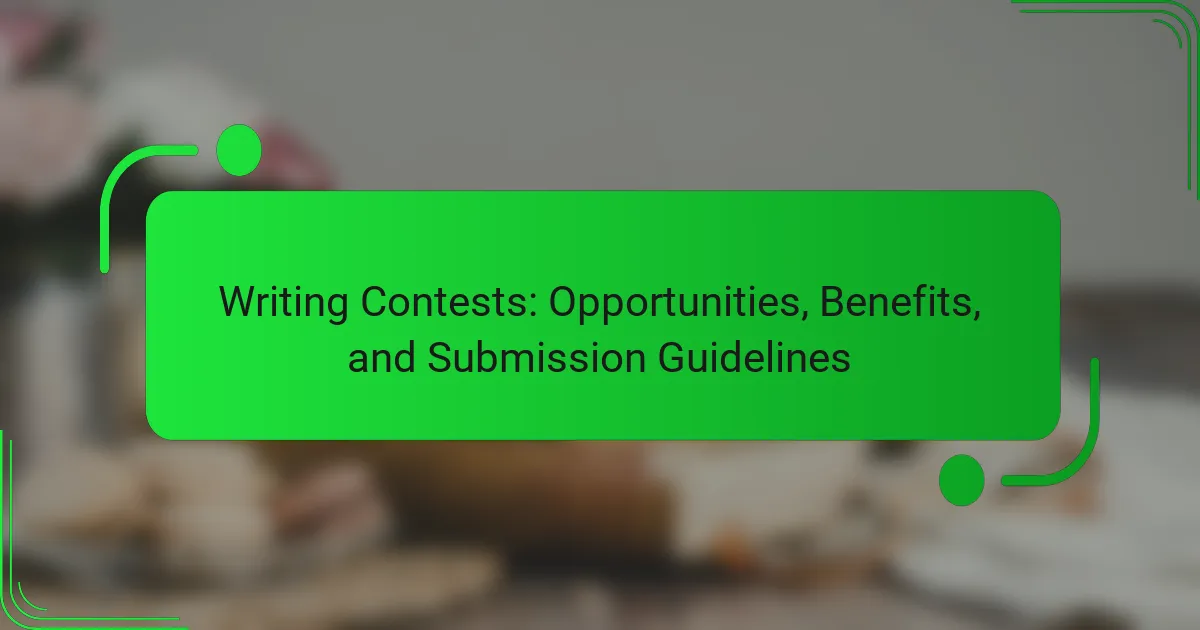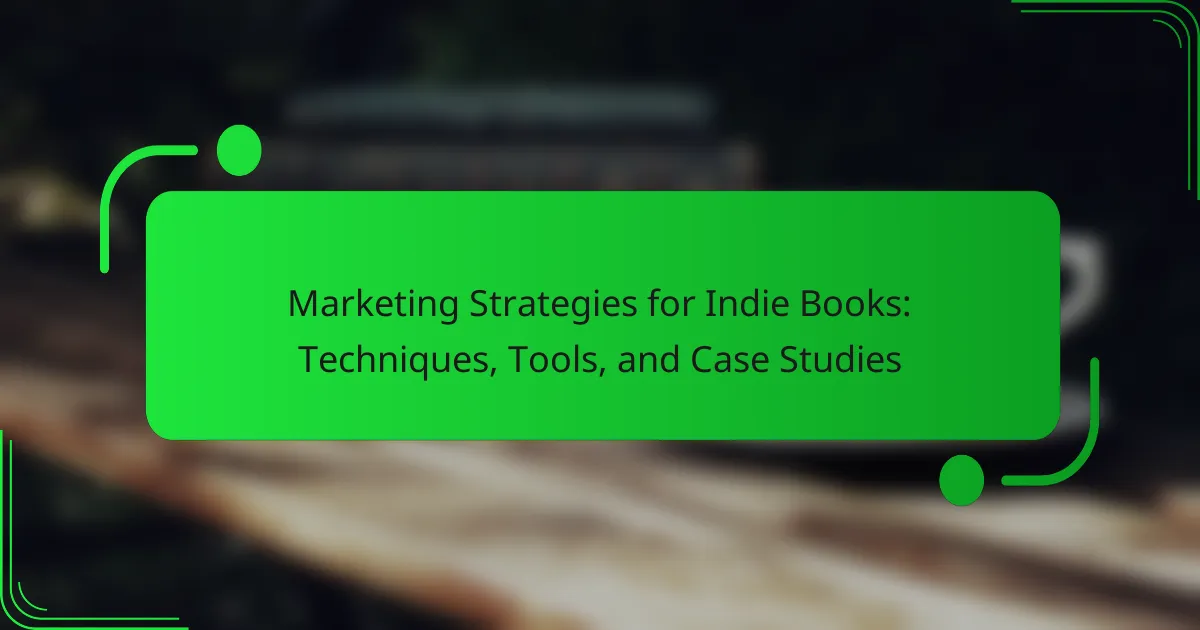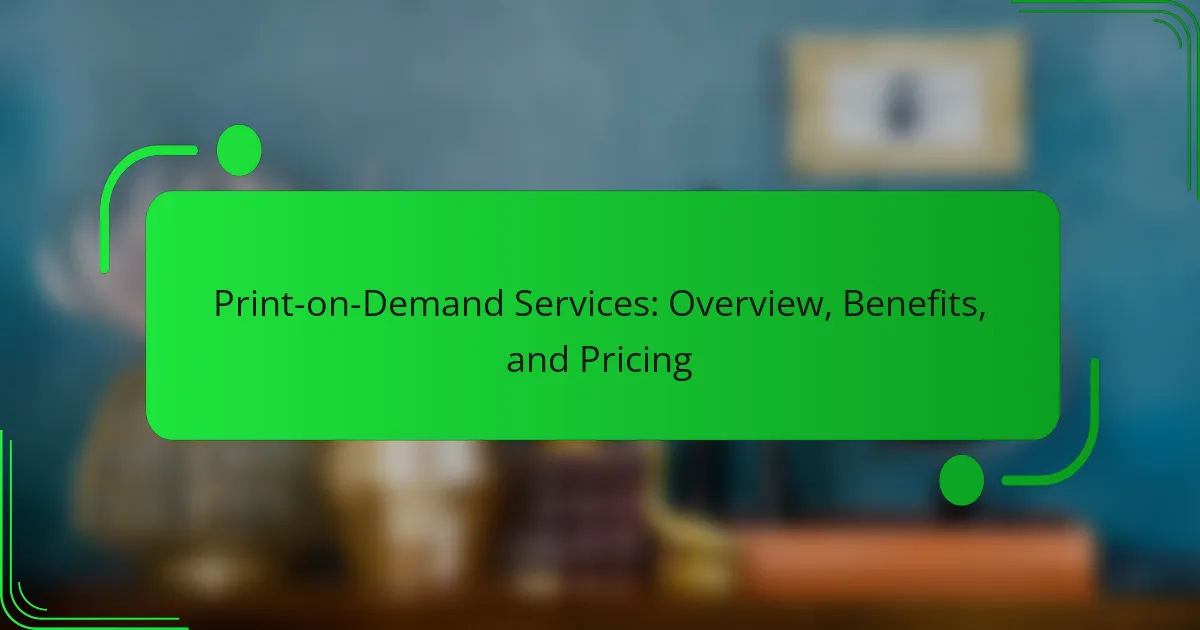Indie authors face significant challenges in protecting their creative works. Copyright provides automatic protection, but registration with the U.S. Copyright Office enhances legal benefits. Enforcement options like cease-and-desist letters and DMCA takedown notices are crucial for addressing infringement. Understanding copyright duration and management ensures indie authors can effectively safeguard their intellectual property.
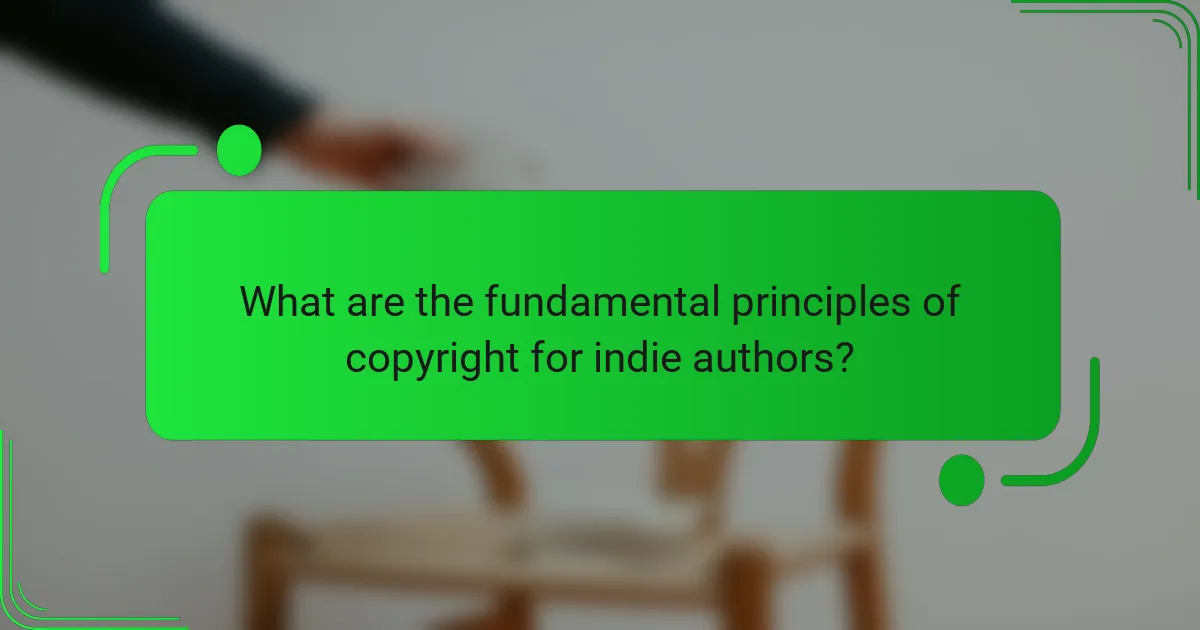
What are the fundamental principles of copyright for indie authors?
Copyright protects indie authors by granting exclusive rights to their original works. Key principles include automatic protection upon creation, the importance of registration for legal benefits, and enforcement options against infringement. Registration with the U.S. Copyright Office provides a public record and eligibility for statutory damages. Enforcement involves monitoring for unauthorized use and pursuing legal action if necessary. Understanding these principles ensures indie authors can safeguard their creative output effectively.
How does copyright protect creative works?
Copyright protects creative works by granting authors exclusive rights to use, distribute, and reproduce their creations. This legal framework helps prevent unauthorized use and ensures that creators can control how their works are shared and monetized. Registration with the copyright office enhances protection and provides legal benefits in case of infringement. Additionally, copyright enforcement allows authors to take legal action against violators, reinforcing their rights and the value of their creative contributions.
Why is copyright important for indie authors?
Copyright is crucial for indie authors as it protects their original works from unauthorized use. It ensures that authors retain control over their creations, allowing them to benefit financially from their labor. Registering a copyright provides legal advantages, including the ability to sue for damages in case of infringement. Additionally, copyright enforcement helps maintain the integrity of the work, preventing alterations or misrepresentations. This protection fosters a supportive environment for creativity and innovation in the indie publishing landscape.
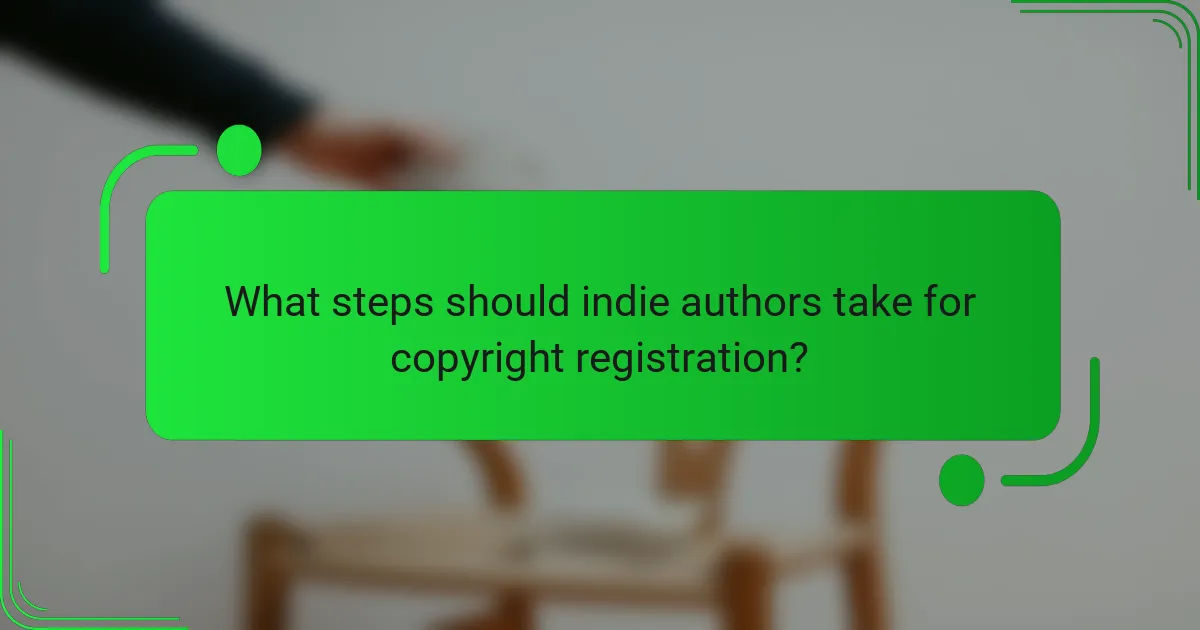
What steps should indie authors take for copyright registration?
Indie authors should follow these steps for copyright registration: gather necessary information, complete the application form, submit the application with the required fee, and keep a copy of the registration.
1. Gather necessary information: Prepare your work’s title, date of creation, and authorship details.
2. Complete the application form: Use the U.S. Copyright Office website to fill out the online form or download a paper form.
3. Submit the application with the required fee: Pay the registration fee, which varies based on the type of work.
4. Keep a copy of the registration: Retain confirmation of your registration for future reference.
How to register copyright in the United States?
To register copyright in the United States, complete the application form on the U.S. Copyright Office website and submit it with the required fee. The process typically takes about 3 to 6 months.
1. Prepare your work for registration.
2. Fill out the online application form.
3. Pay the registration fee, which varies based on the type of work.
4. Submit a copy of your work, if required.
5. Await confirmation and certificate of registration.
This registration provides legal protection against unauthorized use of your work.
What are the specific registration processes in the UK?
The registration process for copyright in the UK involves several key steps. First, authors should create a tangible expression of their work, as copyright protects original works automatically upon creation. Next, while registration is not mandatory, authors can enhance protection by registering their work with an official body like the UK Copyright Service. This provides legal proof of ownership and can aid in enforcement if disputes arise. Additionally, authors should keep detailed records of their work’s creation, including drafts and correspondence, to support their claims if necessary.
Which documents are needed for registration?
To register a copyright, you typically need a completed application form, a non-refundable filing fee, and a copy of the work you wish to protect. These documents confirm your authorship and the originality of your work.
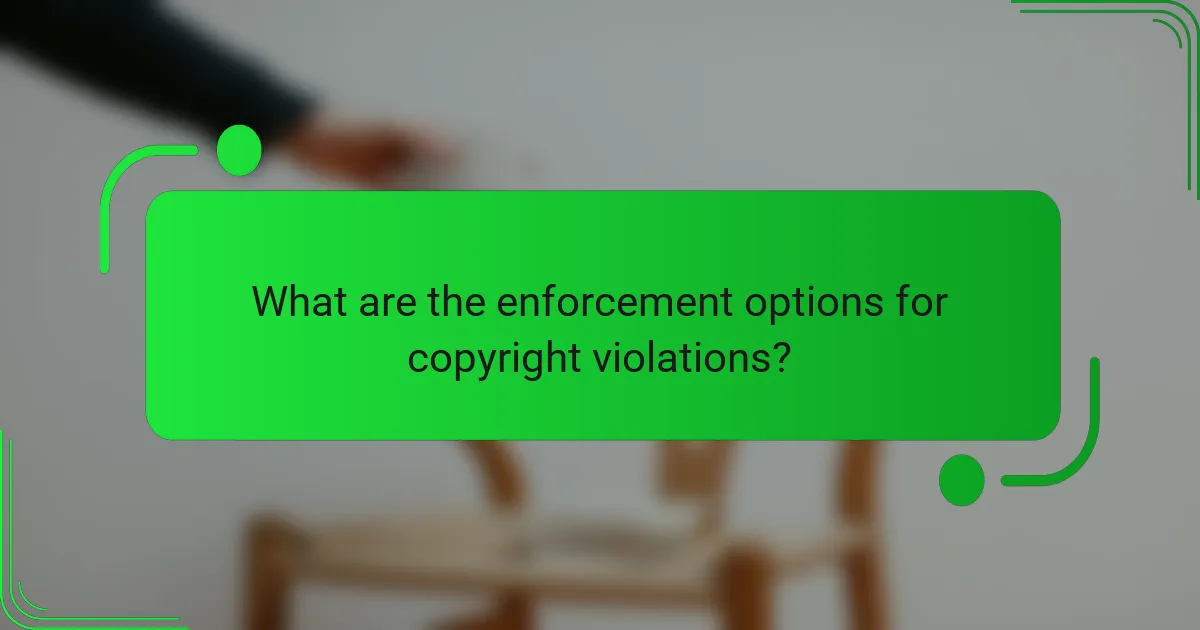
What are the enforcement options for copyright violations?
Indie authors have several enforcement options for copyright violations, including cease-and-desist letters, filing Digital Millennium Copyright Act (DMCA) takedown notices, and pursuing legal action. These methods allow authors to protect their intellectual property effectively.
Cease-and-desist letters serve as formal requests to stop infringing activities. DMCA takedown notices enable authors to request the removal of infringing content from online platforms. Legal action involves filing a lawsuit for damages, which can deter future violations.
Understanding these options empowers indie authors to safeguard their work and uphold their rights in the creative landscape.
How can indie authors identify copyright infringement?
Indie authors can identify copyright infringement by monitoring their works for unauthorized use and understanding legal protections. They should regularly search online platforms for copies of their content, utilize copyright registration, and consult legal resources for guidance. Tools like reverse image search and plagiarism detection software can assist in this process. Additionally, being aware of the unique attributes of their work helps in recognizing potential infringements more effectively.
What are the legal remedies available for copyright infringement?
Indie authors have several legal remedies for copyright infringement, including injunctions, monetary damages, and statutory damages. Injunctions can prevent further infringement, while monetary damages compensate for losses. Statutory damages provide a predetermined amount without proving actual damages. Each remedy serves to protect authors’ rights and uphold copyright law.
How to send a cease and desist letter?
To send a cease and desist letter, clearly state the infringement, identify the infringing party, and request they stop the unauthorized use. Follow these steps:
1. **Address the letter**: Include the infringer’s name and address.
2. **Identify yourself**: State your name, contact information, and your copyright ownership.
3. **Describe the infringement**: Specify how your copyright is being violated.
4. **Demand cessation**: Clearly request that the infringer stop their actions.
5. **Set a deadline**: Provide a reasonable timeframe for compliance.
6. **State consequences**: Mention potential legal actions if they do not comply.
This structured approach ensures clarity and legal soundness in protecting your copyright.
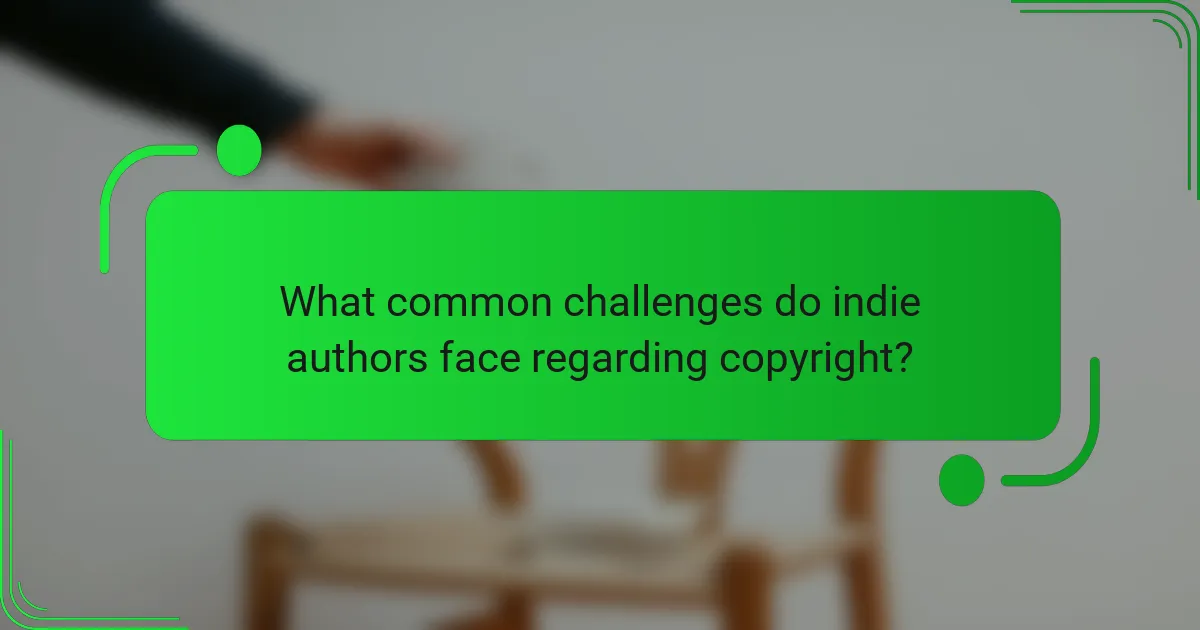
What common challenges do indie authors face regarding copyright?
Indie authors commonly face challenges with copyright registration, enforcement, and understanding fair use. Many authors mistakenly believe that their work is automatically protected, leading to potential infringement issues. Registration can be complex and may require legal assistance, which adds to costs. Additionally, enforcement against unauthorized use can be difficult, especially if the author lacks resources to pursue legal action. Understanding the nuances of copyright law is essential for effective protection and management of creative works.
How to navigate copyright issues with self-publishing platforms?
Indie authors can navigate copyright issues with self-publishing platforms by understanding their rights and obligations. Registering copyright provides legal protection, while reading platform policies ensures compliance. Authors should also consider using Creative Commons licenses to clarify usage rights. Monitoring for infringement is essential for enforcement.
What are the misconceptions about copyright among indie authors?
Many indie authors misunderstand copyright, believing registration is mandatory for protection. In reality, copyright exists automatically upon creation. Another misconception is that copyright covers ideas rather than the expression of those ideas. Additionally, some authors think they cannot enforce their rights without registration, but enforcement is possible even without it. Lastly, there is a belief that copyright lasts forever, while it actually has a defined duration, typically the life of the author plus 70 years.
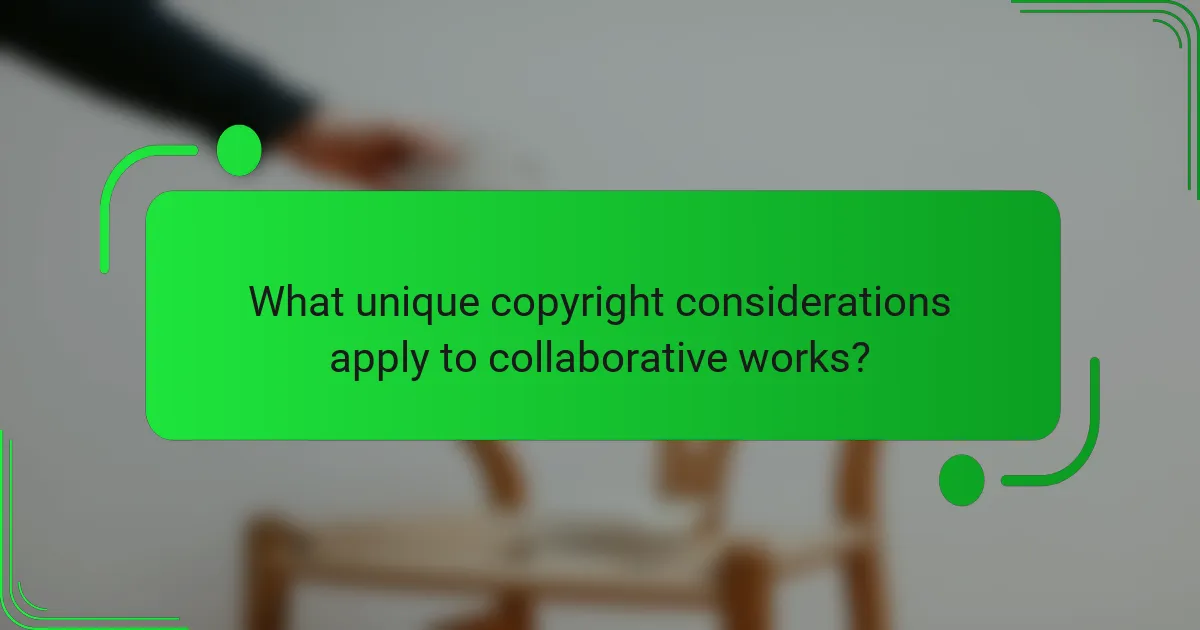
What unique copyright considerations apply to collaborative works?
Collaborative works present unique copyright challenges, primarily regarding ownership and rights allocation. Each contributor typically retains rights to their individual contributions, while joint ownership may arise from the collective work. Clear agreements are essential to define usage, royalties, and credit. This prevents disputes and ensures fair compensation among authors. Additionally, copyright registration for collaborative works can be complex, as it requires consent from all parties involved.
How to manage copyright in co-authored projects?
To manage copyright in co-authored projects, establish clear agreements outlining ownership and rights. Each author should understand their contributions and how copyright applies.
1. Define ownership percentages based on contributions.
2. Create a written agreement detailing rights and responsibilities.
3. Register the work with copyright authorities to strengthen protection.
4. Discuss enforcement strategies for potential infringements.
5. Update agreements as the project evolves to reflect changes in collaboration.
What are the implications of shared rights?
Shared rights can complicate ownership and control over creative works. They often lead to disputes regarding usage, royalties, and credit. For indie authors, understanding these implications is crucial for protecting their interests. Shared rights can limit an author’s ability to independently exploit their work, potentially affecting income and creative decisions. Clear agreements are essential to define responsibilities and expectations among collaborators.
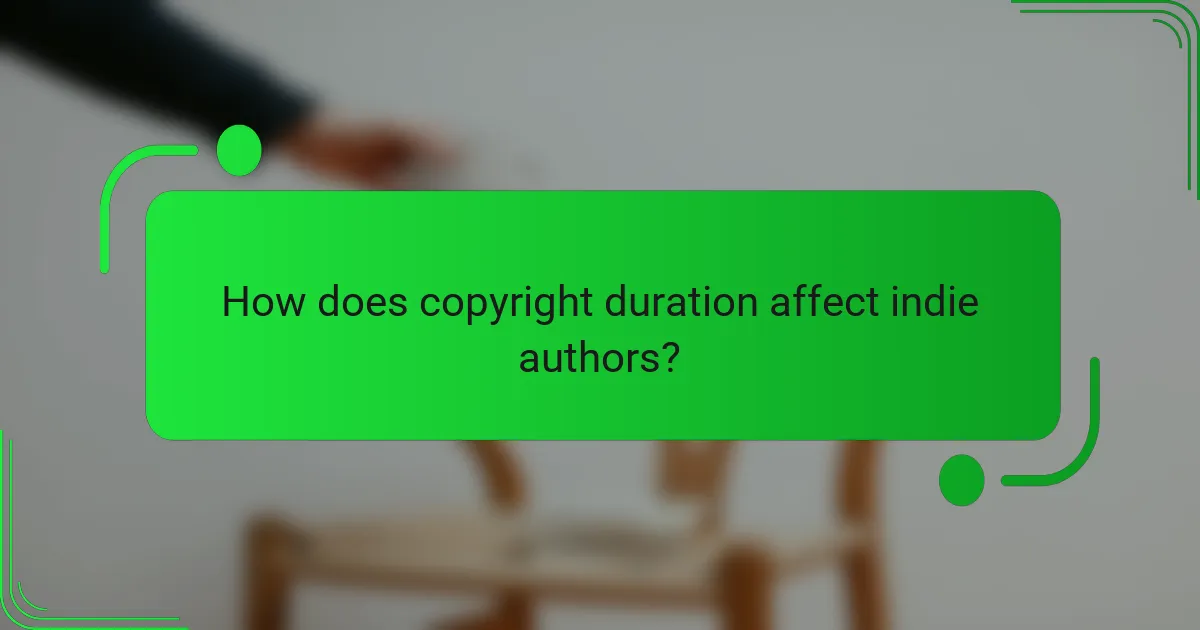
How does copyright duration affect indie authors?
Copyright duration significantly impacts indie authors by determining how long their works are protected. Typically, copyright lasts for the life of the author plus 70 years, influencing their ability to control, monetize, and benefit from their creations. Shorter durations may limit potential earnings, while longer durations provide sustained income opportunities. This extended protection encourages investment in creative projects, fostering a vibrant indie publishing landscape.
What is the typical duration of copyright protection?
Copyright protection typically lasts for the life of the author plus 70 years. For works created by corporations, it lasts 95 years from publication or 120 years from creation, whichever is shorter. This duration ensures that authors and their heirs can benefit from their creations while eventually allowing public access.
How does copyright duration vary by country?
Copyright duration varies significantly by country, influenced by local laws. In many countries, the duration extends for the life of the author plus 50 to 70 years. For example, the United States offers protection for the life of the author plus 70 years, while in some countries, such as Mexico, it is 100 years. This variation affects how indie authors manage their works internationally. Understanding these differences is crucial for proper registration and enforcement of copyright.
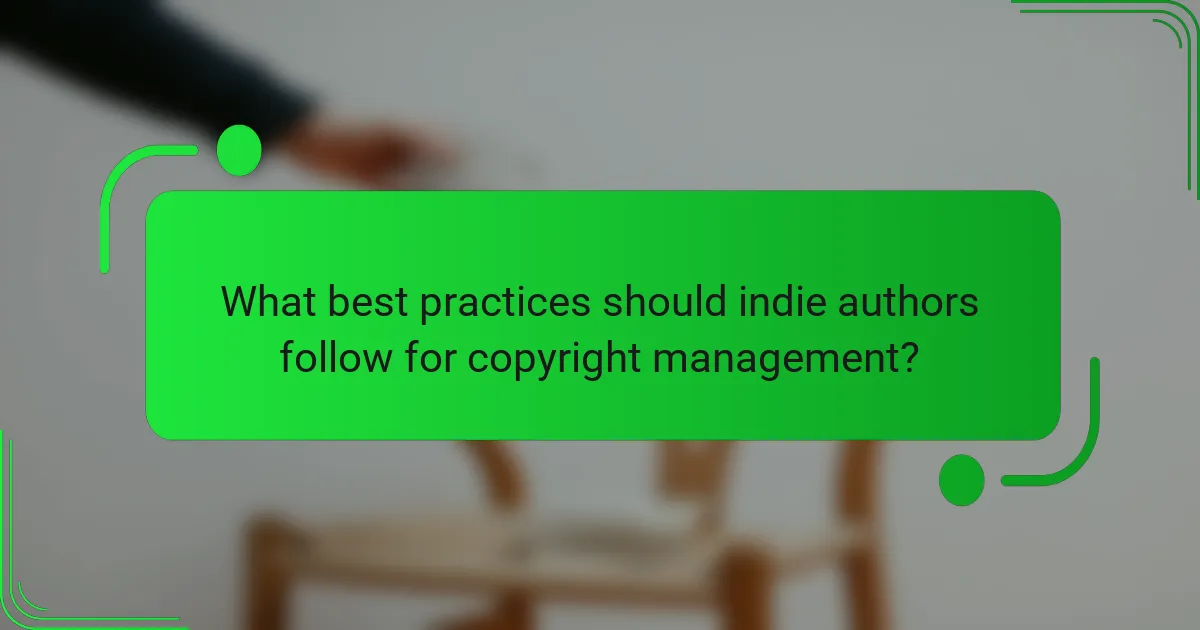
What best practices should indie authors follow for copyright management?
Indie authors should prioritize copyright management by understanding protection, registration, and enforcement. First, protect your work automatically upon creation. Register with the U.S. Copyright Office for legal advantages. Enforce your rights by monitoring for infringement and taking action when necessary. Additionally, consider using licensing agreements to clarify usage rights.
How to keep records of your creative work?
To keep records of your creative work, maintain organized documentation of your projects, including drafts, notes, and final versions. Use digital tools for easy access and backup.
1. Create a dedicated folder structure for each project.
2. Date all files and revisions for tracking progress.
3. Use cloud storage for secure, accessible backups.
4. Document your creative process and any changes made.
5. Register your work with copyright offices for legal protection.
What strategies can help in educating oneself about copyright?
To educate oneself about copyright, indie authors can explore various strategies. Start by reading authoritative resources like government websites and legal guides, which provide foundational knowledge. Attend workshops or webinars focused on copyright, offering practical insights from experts. Join writing groups or forums where copyright issues are discussed, enabling peer learning. Lastly, consider consulting a copyright attorney for personalized advice tailored to specific needs.
What are the most common mistakes to avoid in copyright management?
Common mistakes in copyright management include failing to register works, misunderstanding fair use, neglecting to monitor unauthorized use, and not maintaining proper documentation. These errors can lead to inadequate protection and lost revenue. Additionally, many authors overlook the importance of understanding licensing agreements, which can impact their rights and income. Awareness and proactive management are crucial for indie authors to safeguard their creative works effectively.
